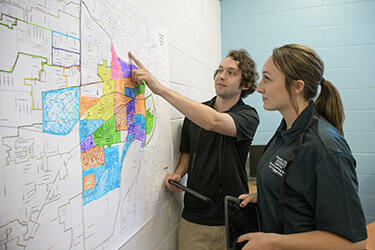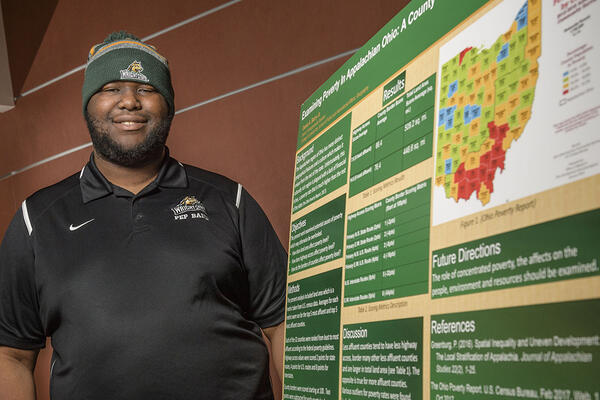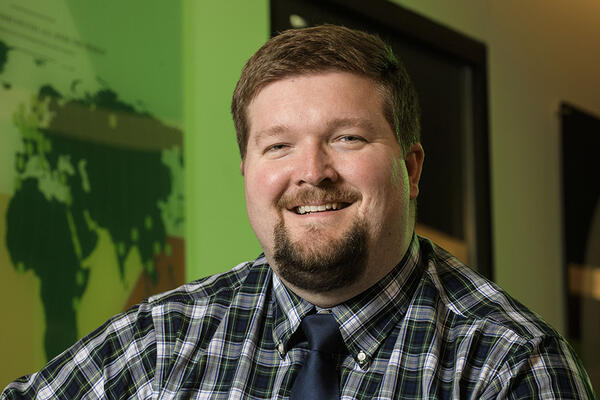On this page:
- Why Choose Geography?
- Careers
- Real-World Experience
- Success Stories
- Academics and Curriculum
- Admission
- Advising
Why Choose Geography?
Geography studies the interaction between human and physical environments. If you are interested in connections between people and places and entering one of the fastest growing areas of applied technologies, Geography may be the major for you.
Over the last several decades, the global economy has transformed communities across America. Geopolitics has affected gasoline prices and the food we buy. Satellite and other spatial information became tools for local police and firefighters to keep us safe, for farmers to increase production, and for intelligence agencies to reduce terrorism. The climate changed and produced extreme weather events around the world and in our own neighborhoods. Geographers study these types of events.
Geography covers a broad base from the design and art of mapping to the analysis of spatial data. Computers and new software have expanded the role of geospatial information from traditional fields like planning and exploration to fields like politics, agriculture, law enforcement, and economic development. The nation's defense depends on geospatial information and the military invests heavily in developing new geospatial tools and the analysis of geospatial data.
Students graduating with the B.S. in geography will be able to:
- Apply analytical tools to analyze geospatial data regarding the global economy, geopolitics, public safety and health, etc.
- Use critical thinking skills to analyze and evaluate local, national, or global political, legal, or social issues.
- Communicate effectively in writing.
- Demonstrate an understanding of the value of diversity and multicultural competence in today's global environment.
Careers
Geographers answer everyday questions, such as what is the best route around a highway detour to questions of survival. For example, How will we feed the world's growing population given changes in earth’s climate? Where are pockets of disease in the world and where have they spread? How does satellite data help us be safe? How does where people live affect their access to healthy food, adequate housing, and sufficient healthcare?
Our graduates work for:
- City, township, county, state and federal agencies
- Engineering and architectural firms
- Economic development
- Intelligence gathering and interpretation organizations
- Construction and mining companies
- Forestry and natural resources conservation
- Tourism
- Climate adaption industry
Our graduates work as:
- Spatial and GIS analysts
- Real estate appraisers
- Planners
- Economic developers
- Market analysts
- Environmental educators
- Map makers
- Workforce consultants
- Energy efficiency program managers
- Security experts
Real-World Experience

An internship is required for all geography majors without sufficient professional experience in the field. The internship is waived if you are already working full-time in your career field and on a case-by-case basis.
The internship provides you three basic benefits:
- You will connect theory and principles they learned in classroom to practice in your career field.
- You will gain professional experience that is often required by employers.
- You will learn about the social network within your career and employment opportunities.
Internship Requirements
The student works with their geography faculty advisor to identify an internship opportunity. The internship scope of work, projects, and/or tasks performed must be clear and approved by the internship coordinator.
- The student works 125 hours during the semester of the internship, and keeps a journal describing the daily activities performed during the internship experience.
- The student submits a reflection paper at the end of 125 hours that summarizes the internship experience, what was learned, how coursework was applied, and how the experience might be improved.
Success Stories
Academics and Curriculum
You should meet with a faculty advisor before enrolling and each semester thereafter. The faculty advisor can help you plan your courses and recommend how you can use your electives to enhance your degree by earning a minor, certificate, or honors.
View Bachelor of Science in Geography program information and degree requirements in the Academic Catalog.
Admission
Complete the admission application and list geography as your intended major.
If you are a current student and wish to change majors, submit a Major/Minor Change Request by logging in to WINGS, then select Student Academics under Your Launchpad. If you are an undecided/exploratory student, talk to your advisor about switching your major to geography.
Advising
You will have two advisors available to help you throughout your academic experience:
- An academic advisor within university academic advising (937-775-2601)
- A faculty advisor (378 Allyn, 937-775-2942. or SoSSIS@wright.edu)
Once you have been accepted into the undergraduate program as a geography major or minor, you will receive a welcome letter informing you of your advisor and the contact information.
Whether you are a transfer student from another college or university, changing majors at Wright State, or adding a minor, you should meet your geography advisor as soon as possible to learn your degree requirements and to acquaint yourself with the educational opportunities available to geography students.


